Key takeaways:
- Blockchain technology acts as a secure and decentralized digital ledger, ensuring transparency and trust in transactions.
- Blockchain audits are crucial for verifying the accuracy and compliance of transactions, enhancing overall security in the crypto ecosystem.
- Audits identify vulnerabilities in code, foster a culture of transparency, and build trust among users, making them essential to prevent financial losses.
- Engaging with audit teams and understanding different audit types can significantly enhance the security and effectiveness of blockchain projects.
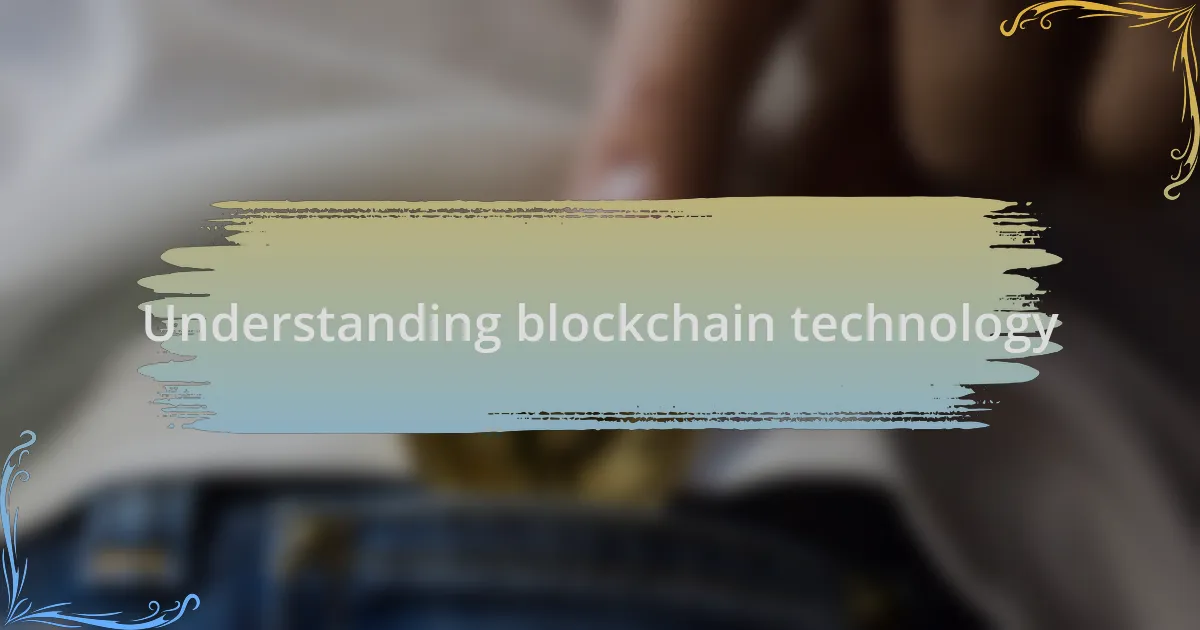
Understanding blockchain technology
Blockchain technology is essentially a digital ledger that records transactions across many computers, making it nearly impossible to alter or hack. I remember the first time I explained this concept to a child; their eyes lit up with wonder at the idea of a secure, shared record that everyone could trust. It made me realize that even complex ideas can seem approachable when we highlight their fundamental purpose: transparency and security.
At its core, blockchain operates through a series of blocks, each containing a group of transactions linked to the previous block — hence the name ‘blockchain.’ I often liken it to a long chain of linked LEGO pieces, where every piece represents a verified transaction. Doesn’t it feel empowering to think of technology in such an interactive and tangible way?
Moreover, the decentralized nature of blockchain means that no single entity controls it, which can be a powerful concept for young minds to grasp. I often ask kids if they would trust a game where only one person had all the power; naturally, they say no. This openness not only enhances security but also encourages collaboration, a valuable lesson for teamwork in any endeavor they might face in the future.
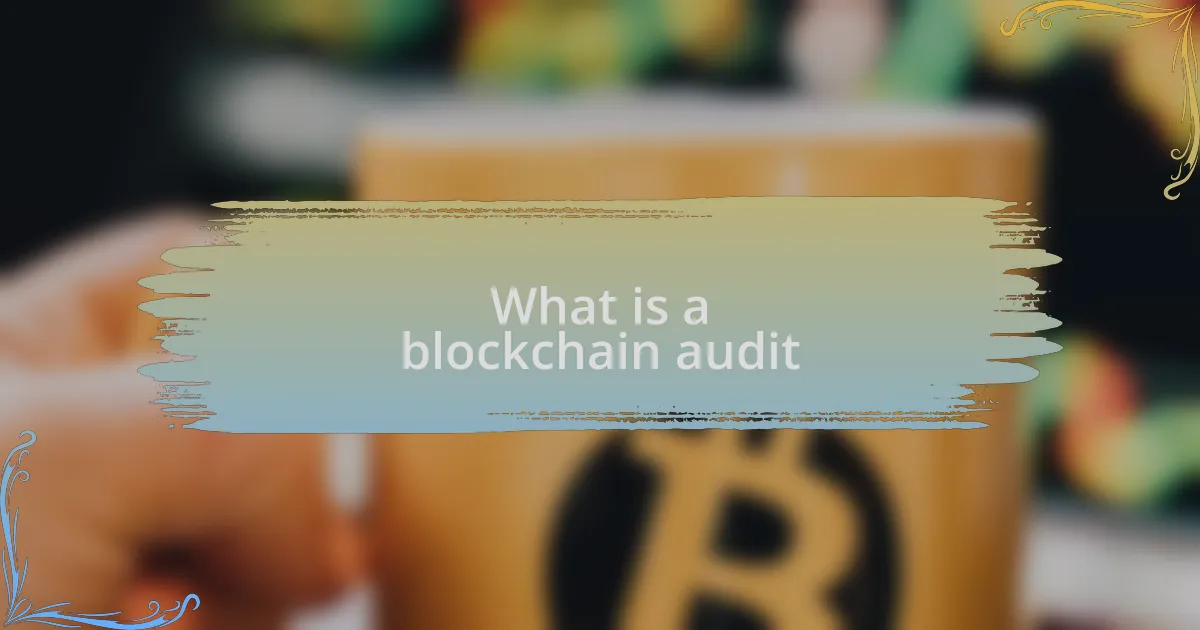
What is a blockchain audit
A blockchain audit is a thorough examination of the blockchain’s records, ensuring that the transactions are accurate and compliant with established regulations. When I first encountered the concept of audits, it struck me how similar they are to checking your homework before turning it in. You want to ensure everything’s correct and nothing’s been overlooked—especially when it comes to something as crucial as financial transactions.
During an audit, experts analyze the data on the blockchain to detect any discrepancies or fraudulent activities. I recall working with a team on a project where we had to review our transactions for integrity. The attention to detail was intense, but it was rewarding to know we were safeguarding our work and maintaining trust with our users.
But why is this important, especially in the world of crypto? Imagine if a game you loved had bugs that you never knew existed, causing unfair advantages or losses. Just as a well-designed game requires checks and balances, blockchain audits play a vital role in maintaining the system’s integrity, creating a safer environment for everyone involved. Wouldn’t you feel more secure knowing that your favorite games or apps are double-checked for accuracy?
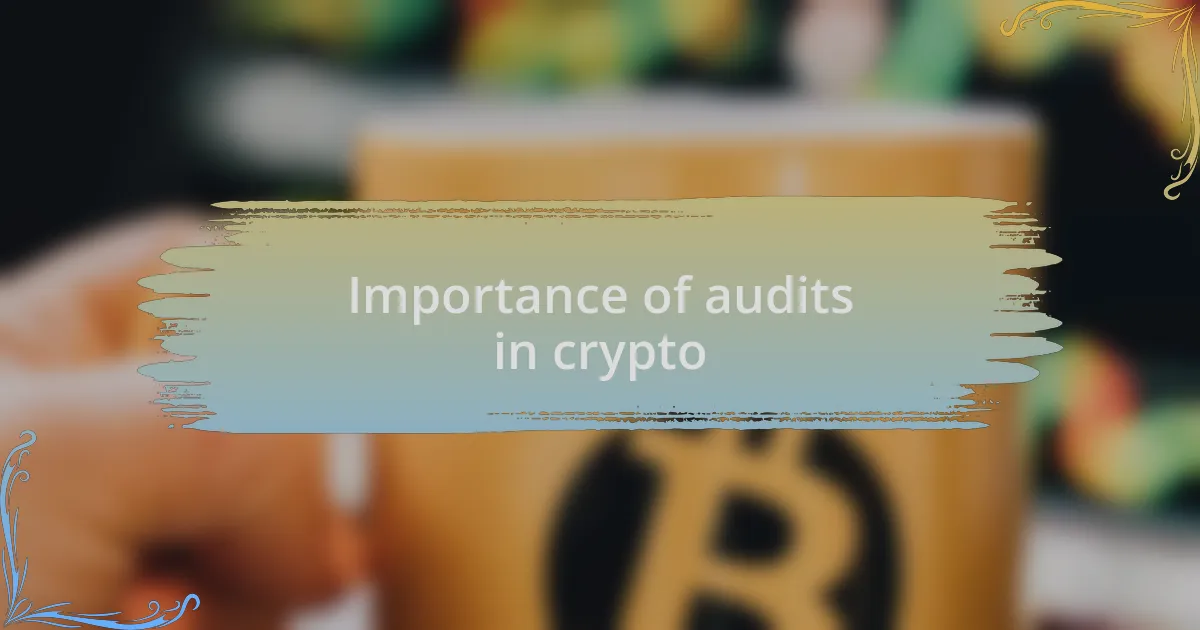
Importance of audits in crypto
When it comes to crypto, audits serve as a safety net against potential pitfalls. I’ve seen projects that seemed promising but fell victim to hacks or financial discrepancies simply because they skipped the audit step. Wouldn’t you feel uneasy investing in something that hasn’t been verified for security? It’s like riding a rollercoaster without checking the safety harness—thrilling but potentially hazardous.
The importance of audits extends beyond mere financial safety; they also enhance trust in the entire crypto ecosystem. I remember chatting with a friend who hesitated to invest in crypto due to past experiences with scams. After explaining how regular audits help establish credibility and trust, I could see his hesitation fade. Isn’t it reassuring to know that a thorough check can validate the promise of innovation in this space?
Moreover, audits can prevent losses before they even happen. In my experience, being involved with an audited project provided peace of mind. It’s like knowing your favorite toy was tested for safety—knowing that these audits can catch issues before they affect users is vital for anyone looking to engage with cryptocurrencies. Don’t you think that being forewarned is being forearmed?
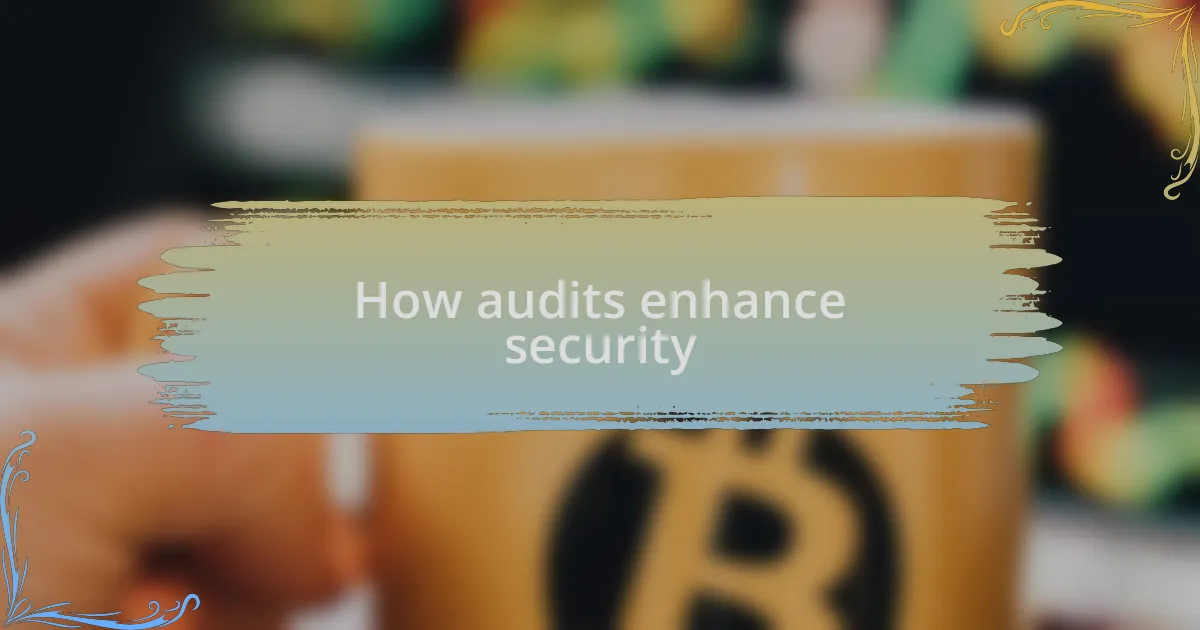
How audits enhance security
One fundamental way audits enhance security is by identifying vulnerabilities in a project’s code before they can be exploited. I recall working on a blockchain initiative where we uncovered coding flaws during an audit. The relief was palpable when we realized we had caught these potential security threats in time—imagine the chaos if we hadn’t. Wouldn’t you want that level of thoroughness applied to every crypto project you consider?
Additionally, audits bolster the integrity of the operations by ensuring compliance with established guidelines. I remember feeling a sense of confidence when a platform I was using proudly displayed its audit results. It was as if a seal of approval reassured me that the platform was being held accountable to high standards. Isn’t it comforting to know that there’s a third-party validation process that checks whether a project is playing by the rules?
Finally, audits not only serve as a deterrent to bad actors but also foster a culture of transparency in the crypto space. I’ve seen how platforms that prioritize audits tend to attract more users because they’re deemed safer. It’s much like choosing a restaurant with glowing reviews over one that has little information available—would you want to dine somewhere that raises more questions than it answers?
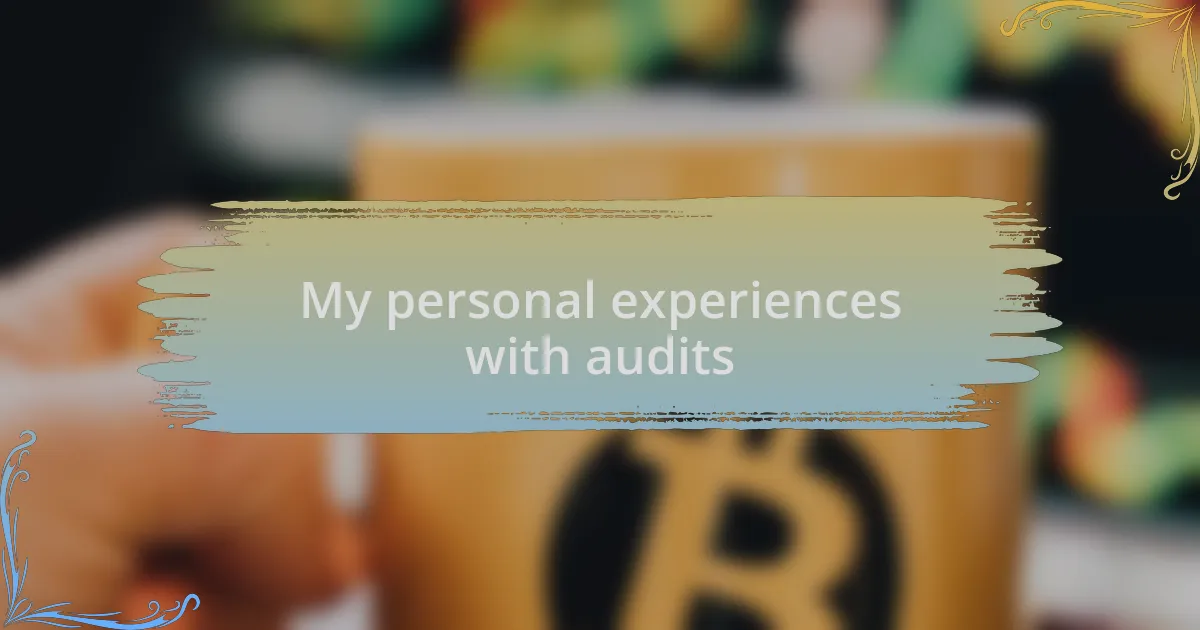
My personal experiences with audits
During my journey in the crypto world, I’ve participated in several audits, and each experience has been enlightening. I distinctly remember one instance where the audit team discovered a minor oversight that could have led to significant financial loss. The relief among the team was palpable, a shared breath held and then released when we realized we had dodged a potentially costly bullet together.
After my first audit experience, my perspective on safety in crypto shifted dramatically. I can recall a moment of enlightenment when our project received its audit results; the sense of pride and reassurance that flooded the room affirmed the hard work we’d put into ensuring our code was secure. Have you ever felt that overwhelming blend of tension and joy when the stakes are high? For me, it reinforced the idea that audits are not merely procedural—they’re essential to building trust.
Another memorable audit brought to light some unexpected weaknesses in our smart contracts. I felt a mix of anxiety and anticipation as we dove into the findings. The process highlighted the importance of continuous improvement, an ethos I strive to carry through every project I undertake. Isn’t it fascinating how these challenges can turn into stepping stones for innovation?
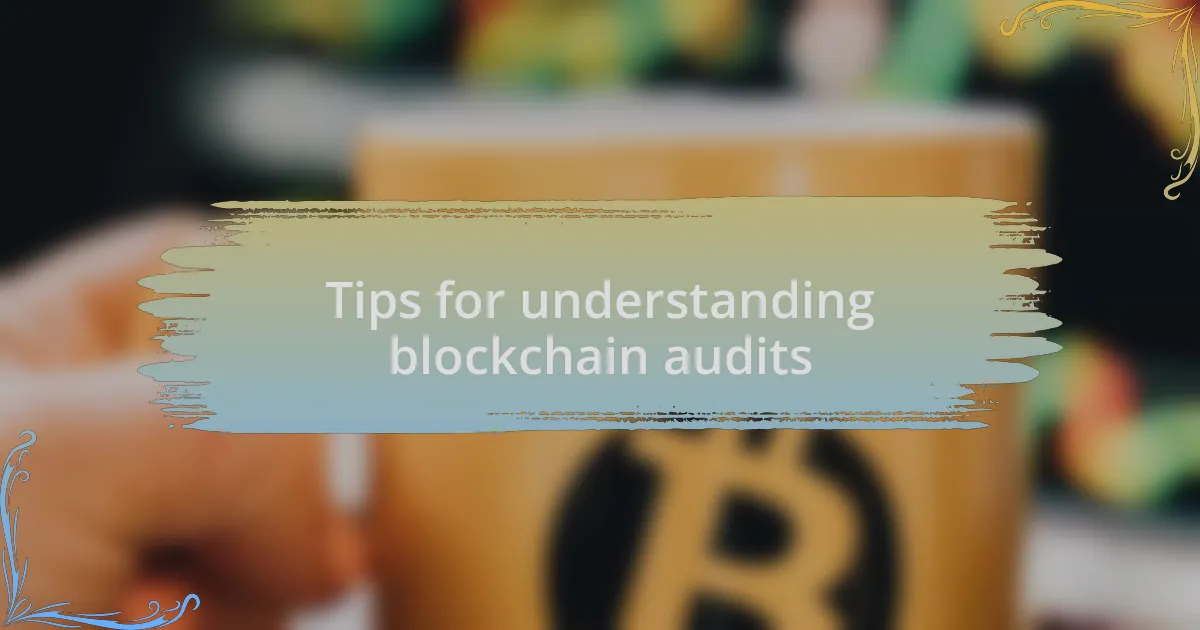
Tips for understanding blockchain audits
Understanding blockchain audits can seem daunting at first, but breaking it down into key elements helps. I remember when a team member showed me how to read an audit report during one of our projects. It was like unveiling a treasure map—suddenly, all the technical jargon became actionable insights that clarified our project’s strengths and weaknesses. Have you ever found clarity in confusion? It’s a liberating feeling.
Another essential tip is to familiarize yourself with audit types. When I first learned about smart contract audits versus security audits, it changed my approach entirely. Each type serves a distinct purpose, and knowing which one your project needs can make a significant difference. It’s like choosing the right tool for a job—would you use a wrench to hammer a nail?
Engagement with your audit team is crucial for success. During one audit, I made it a point to ask questions about the findings, and it transformed my understanding of potential risks. I found that open communication led to deeper insights and collective problem-solving; it was a moment that underscored how collaboration enhances security. Have you ever had a conversation that opened your eyes? Those dialogues can pave the way for a safer future in blockchain.